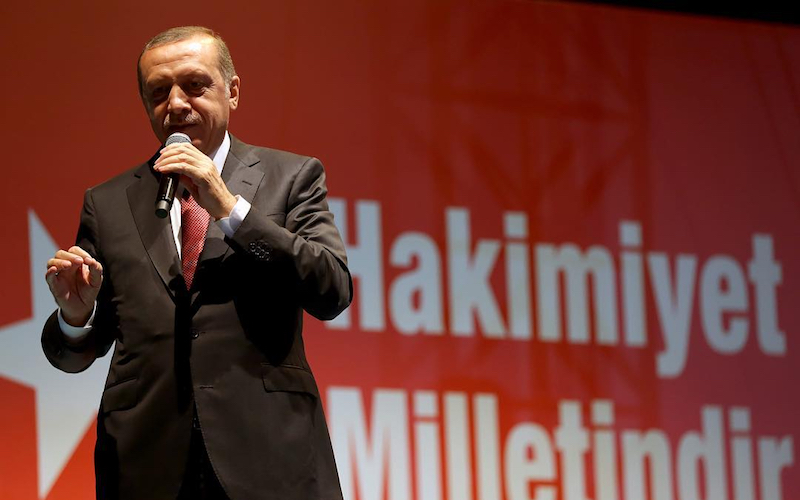
EU-Turkey Relations: Balancing Values and Security Interests
Not since the inception of the European Union has any Turkish government been able to exert so much influence on the development of the EU as now. In fact, Erdogan has the EU with its back against the wall. Thorough thinking on the side of the EU is required in order to balance its precarious position.
With around 2.5 million refugees situated within the Turkish borders, a release into Europe of any significant number of them would renew the intense strain on European resources to cope with the movement of refugees. Apart from being unable to properly cope with this magnitude of refugee movement into the EU in the short run, the EU has not the capacity available, nor the legal ground to stand on to provide sufficient security against such large movements. Thus, no wonder that the Bulgarian Foreign Minister disputes the public claim that Bulgaria would be in favor of freezing the EU accession negotiations with Turkey, an initiative which Erdogan interpreted as evidence of poor understanding from the side of the EU on the actions taken by his government after the coup attempt. Also no surprise that, apart perhaps from trying to position the European Commission in the driver’s seat when it comes to EU Turkey relations, Jean-Claude Juncker is perhaps with some reluctance insists that engagement with Turkey needs to be maintained including holding the book open on EU accession.
Still, those voices in Europe, including the Dutch and Austrian government that have pled in favor of freezing the accession talks with Turkey have a strong appeal with a significant part of the European population. European citizens know that there can be no trading when it comes to human rights, they are indivisible, and they are equally aware that the plight of refugees is one that is most certainly real enough in many cases to justify a considerable amount of humanitarian assistance, but they also realize that if large numbers of people enter their societies, this brings unprecedented changes to the social fabric in Europe.
Any simple reference to ‘populism,’ ‘xenophobia,’ ‘non-discrimination’ and other such terms often found in the supranational discourse are not going to be enough to truly win the hearts and minds of the European people. In order for the EU not to let the forces of gravity decide, it is crucial Europe finds more than just ways to accommodate international law, financial burden and logistics.
One point to mention here is that Europe has been influenced by Middle Eastern thought, yet the high authorities on the European continent have over the centuries, with general success, consistently held the foreign demos outside European borders. Why?
Again no wonder, no wonder that there is currently a significant renewed impetus to find effective and practicable ways to collaborate between member states on European defense matters. As the debate on December 8th in the European Parliament (the Security and Defense sub-committee) illustrates, capabilities are likely to remain far below meaningful levels.
The introduction of a European Defense Fund (strangely enough intended to be managed outside ordinary fiscal restraints and by a bank that is bound by a not very accommodating investment philosophy) may help countries save significantly on tasks that would otherwise be duplicated, but will not help in any direct sense to face the EU’s challenges in its neighborhood.
EU battlegroup formations will continue to be difficult to integrate, given the different military traditions that exist between the EU member states. As a result it will be a puzzle how a meaningful Common European Defense policy can be given shape by using battlegroups in PESCO.
Additionally, as it stands the European Defense Agency functions (as far as we know) are an enabler for the member states, but are not given real force when it comes to strategic direction and implementation. The Political and Security Committee of the Council of the EU does appear to have a bigger say in the implementations of European missions, yet is again bound by intergovernmental cooperation.
The question is of course whether this is problematic, and perhaps it isn’t in and of itself. EU member states can continue to form coalitions of the willing when necessity. The real question is, of course based on which principles.
Although European defense integration has proven to be consistently popular amongst European citizens, the interventions made in recent history, in particular in the Middle East and North Africa, have been considered large failures and governments have thus become more reluctant to intervene.
Moreover, European member states, and the EU High Representative for Foreign Affairs and Security Policy, Federica Mogherini, have pledged to abide by international law and by the Treaties of the EU. Given this framework, the EU appears to have little legal means available to support the hard security challenge that might be considered to arise if Erdogan would open his borders to Europe for refugees. The EU would remain bound by humanitarian law and has to frame itself around legal clauses that offer few motives to use territorial defense as a ground for military operations. On top of that, it would be easy for Erdogan to start criticizing the EU for its own human rights policy if the EU would not let refugees moving from Turkey come through.
Despite the above reservations, the European Union Implementation Plan on Security and Defense appears to contain a significant number of references that project the EU into a wide variety of defense operations. Mention is made of options like ‘temporarily substituting or reinforcing domestic civilian security, law enforcement or rule of law, in case of breakdown of normal state functions, projecting stability in order to re-establish security in a degrading humanitarian situation by protecting civilians, denying a terrorist organization or armed group a foothold in a fragile country, or creating a safe environment in which a country can recover from war and destabilization,’ ‘contributing to maritime security/surveillance worldwide but most immediately in areas relevant to Europe in the context of specific security needs, including aerial and space capabilities,’ ‘CSDP’s ties with Freedom/Security/Justice (FSJ) actors, notably the European Border and Coast Guard Agency and Europol, at the strategic level and in the field, to support the monitoring and security of land, sea and air borders in light of security needs,’ ‘joint crisis management operations in situations of high security risk in the regions surrounding the EU,’ ‘joint stabilization operations, including air and special operations.’
Also, as pointed out by others in European civil society, the EU’s New Consensus on Development contains phrases that lead one to believe the EU might at some point stretch the legal basis for common defense to the maximum, for example: “The EU will work with security sector actors, including military actors under exceptional circumstances, to build their capacity to support sustainable development objectives, and will promote shared solutions to security and development challenges, including through Security Sector Reform.”
Picturing these types of measures being taken in the geographical context of the refugee crisis automatically draws one to think that the EU is moving from being a soft power to being a soft power that is at least strongly complemented or conflicting with hard power capabilities.
Trump’s campaign standpoint that the EU will have to start carrying more of the burden for its security on its own only emphasizes the difficulty the EU is in. Real additional resources are needed in order for the EU’s ambitions to materialize and the question is what can be effectively provided by the pledges made in the NATO framework (2% of EU GDP spend on defense) to be enough to appease Trump, to face the challenges and to fit with the EU’s values and its obligations under international law.
Still, it is now for the EU to show its resilience and to help its member states to make fundamental choices for the future. Will they drag their feet until crisis erupts again or will it be different this time?
